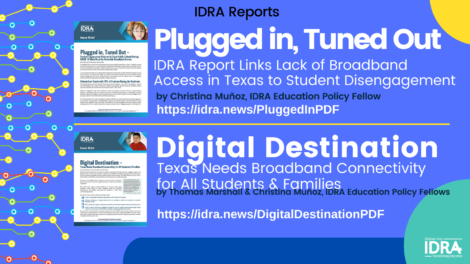• Thomas Marshall • IDRA Newsletter • June-July 2021 •
 Student success depends on the quality of the education resources that enable young people to learn, engage and grow. Access to reliable Internet service, devices like computers, and the knowledge of how to use those services and devices are critical education resources. Along with the COVID-19 pandemic and switch to virtual learning, having full participation in our society with technology, otherwise known as digital equity, became a priority for IDRA and for the Texas Legislature.
Student success depends on the quality of the education resources that enable young people to learn, engage and grow. Access to reliable Internet service, devices like computers, and the knowledge of how to use those services and devices are critical education resources. Along with the COVID-19 pandemic and switch to virtual learning, having full participation in our society with technology, otherwise known as digital equity, became a priority for IDRA and for the Texas Legislature.
House Bill 5, the state broadband bill led by Rep. Trent Ashby, includes key provisions for a statewide broadband office, a statewide broadband plan, and a grant program so that schools and other entities can apply for federal broadband dollars distributed by the Federal Communications Commission (FCC).
HB 5 incentivizes the expansion of broadband Internet access to areas across the state through the State Broadband Development Office, which can award grants, low-interest loans and other incentives to build out broadband access. Passage of this bill was important for students and schools because it allows schools to apply for these loans to get students and families connected to the Internet.
 Importantly, IDRA worked to ensure urban school districts were included in HB 5 because urban children, many of whom are students of color, often are left out of the conversation when it comes to expansion of broadband access. Our report, Plugged In, Tuned Out – Student Engagement Patterns in Texas Public Schools During COVID-19 Show Need for Statewide Broadband Access, showed that limited Internet access in large urban districts was connected to lower rates of student engagement (Quintanilla-Muñoz, 2021).
Importantly, IDRA worked to ensure urban school districts were included in HB 5 because urban children, many of whom are students of color, often are left out of the conversation when it comes to expansion of broadband access. Our report, Plugged In, Tuned Out – Student Engagement Patterns in Texas Public Schools During COVID-19 Show Need for Statewide Broadband Access, showed that limited Internet access in large urban districts was connected to lower rates of student engagement (Quintanilla-Muñoz, 2021).
IDRA held multiple virtual forums where students, parents and educators shared stories of the Digital Divide’s effect on them. Many provided testimony and public comments on pending legislation.
Unfortunately, the Texas legislature missed the opportunity to pass several other pieces of legislation to increase digital equity. HB 129, by Rep. Mary E. González, would have created a digital citizenship curriculum as part of sixth grade social studies standards. The curriculum would have included digital ethics, digital etiquette, media literacy, and how to have healthy relationships with the Internet. The bill also would have expanded digital literacy by teaching young people to navigate various digital platforms and understand, assess and communicate through them.
IDRA launched a digital equity video campaign to uplift the voices of Texas community members impacted by the digital divide.
HB 3889, by Rep. Ana-María Ramos, would have ensured economically disadvantaged students did not have to pay for an Internet access program, if the Texas Education Agency were to create one. HB 4391, by Rep. James Talarico, would have created student and family engagement plans for schools to create more multimodal communication methods for schools to keep up with their students.
The digital divide will not be closed after this session, but the legislature made progress toward getting students and families connected to the Internet. Communities must be at the center of this legislation because they know where the points of access are needed most.
Resources
FCC. (May 10, 2021). FCC to Launch $7.17 Billion Connectivity Fund Program New Program Provides Funding to Schools and Libraries Critical to Closing the Homework Gap. Washington, D.C.: Federal Communications Commission.
Marshall, T. (February 2021). Texas Needs an Equitable State Broadband Plan to Serve Students and Families. IDRA Newsletter.
Marshall, T., & Muñoz, C. (April 20, 2021). Digital Destination – Texas Needs Broadband Connectivity for All Students & Families. San Antonio: IDRA.
Quintanilla-Muñoz, C. (May 19, 2021). Plugged in, Tuned Out – Student Engagement Patterns in Texas Public Schools During COVID-19 Show Need for Statewide Broadband Access. San Antonio: IDRA.
Thomas Marshall is an IDRA Education Policy Fellow. Comments and questions may be directed to him via e-mail at thomas.marshall@idra.org.
[©2021, IDRA. This article originally appeared in the June-July 2021 IDRA Newsletter by the Intercultural Development Research Association. Permission to reproduce this article is granted provided the article is reprinted in its entirety and proper credit is given to IDRA and the author.]



